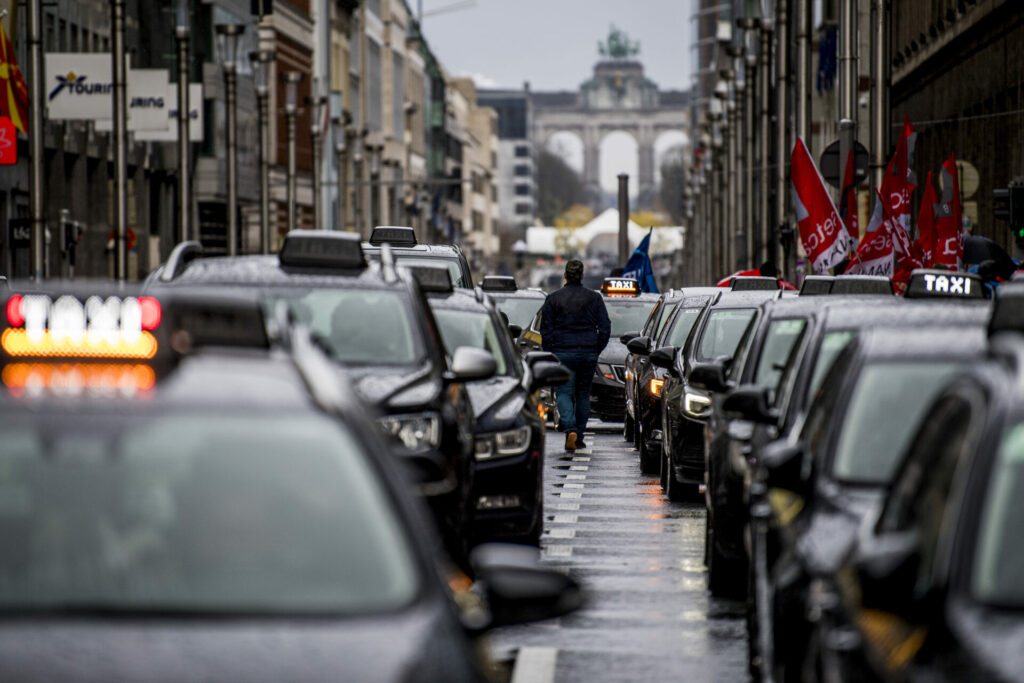Uber has stopped at nothing in its aggressive worldwide expansion, according to Uber files – a global investigation based on 124,000 documents leaked to The Guardian UK newspaper.
The data includes emails, iMessages and WhatsApp messages between the Silicon Valley company's top executives. The leaked information concerns 40 countries and dates from 2013 to 2017 – a period when Uber aggressively expanded worldwide. The information shows how the company "broke the law, duped police and regulators, exploited drivers and secretly lobbied governments across the world," The Guardian writes.
To help the investigation, the Guardian shared the data with 180 journalists in 29 countries, including Knack, De Tijd and Le Soir in Belgium, through the International Consortium of Investigative Journalists (ICIJ).
Uber in Belgium
When Uber arrived in Brussels in February 2014, the American tech giant quickly began battling the government as well the taxi sector.
The leaked papers reveal questionable practices that the app-based service used to escape checks and undermine investigations.
Uber did everything in its power to gain ground in the Belgium market, including using private detectives against taxi competitors in Brussels, infiltrating the Brussels Mobility agency and sabotaging a court search. In addition, Uber immediately sent an intelligence agency to target its main competitors in the taxi sector in Brussels: Taxis Bleus and Taxis Verts.
The kill switch
For Uber, it was key to prevent government officials from finding incriminating data on their tax and social practices during a raid at the company's Brussels office. Uber developed a technique called the "kill switch" in which it sent out frantic instructions to IT staff to cut off the company's data system, so the authorities wouldn't be able to collect evidence.
Not only was the technique used in Belgium, it was deployed at least 12 times during raids in France, the Netherlands, Belgium, India, Hungary and Romania.
Uber developed a playbook that pressured governments to amend laws that opened the door to the app-based, gig-economy framework, which has spread worldwide.
Related News
- Taxi and Uber drivers stage protest in front of Brussels parliament
- ‘Unjust and incomprehensible’: Uber ‘blindsided’ by Brussels Taxi Plan
- Belgium in Brief: No more rules (for now?)
In June 2022, the Brussels parliament approved a bill to reform the taxi sector, giving Uber a legal framework to operate alongside traditional taxi companies. However, the company's legal woes in the city aren't solved yet – old criminal files against Uber have not yet been processed.
Moreover, an investigation into Uber couriers who deliver food is underway regarding employment status infringements.
Undeclared political lobbying
The Uber files reveal how the company was in touch with leading politicians such as America's Joe Biden as well as France's Emmanuel Macron, who is now under fire for his dealings with Uber when he was economy minister in 2014.
Investigations by France's Le Monde and The Guardian indicate that Macron had several undeclared meetings with Uber executives between 2014-2016 as minister. Le Monde claims that Uber made a secret deal with Macron concerning regulation of the company, even while it disrupted the traditional taxi sector.
French opposition MPs on both the left and the far-right have blasted the president, who is known for his support of business interests.
Former Dutch European Commissioner Neelie Kroes lobbied for Uber in 2015 and 2016 behind the scenes, despite the Commission forbidding her from acting for the company. That didn't stop Kroes from meeting government officials, as well as the Dutch Prime Minister Mark Rutte on Uber's behalf.
Following the revelations, Uber said in a statement: "We have not and will not make excuses for past behaviour that is clearly not in line with our present values. Instead, we ask the public to judge us by what we’ve done over the last five years and what we do in the years to come."

